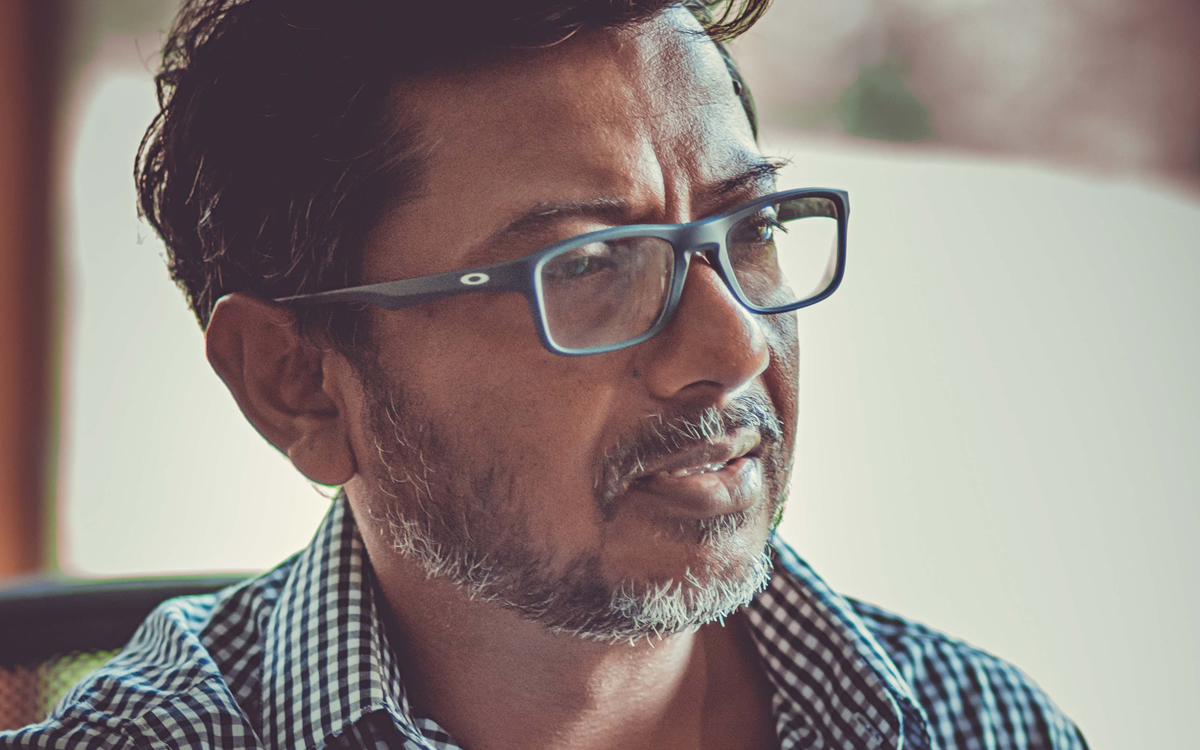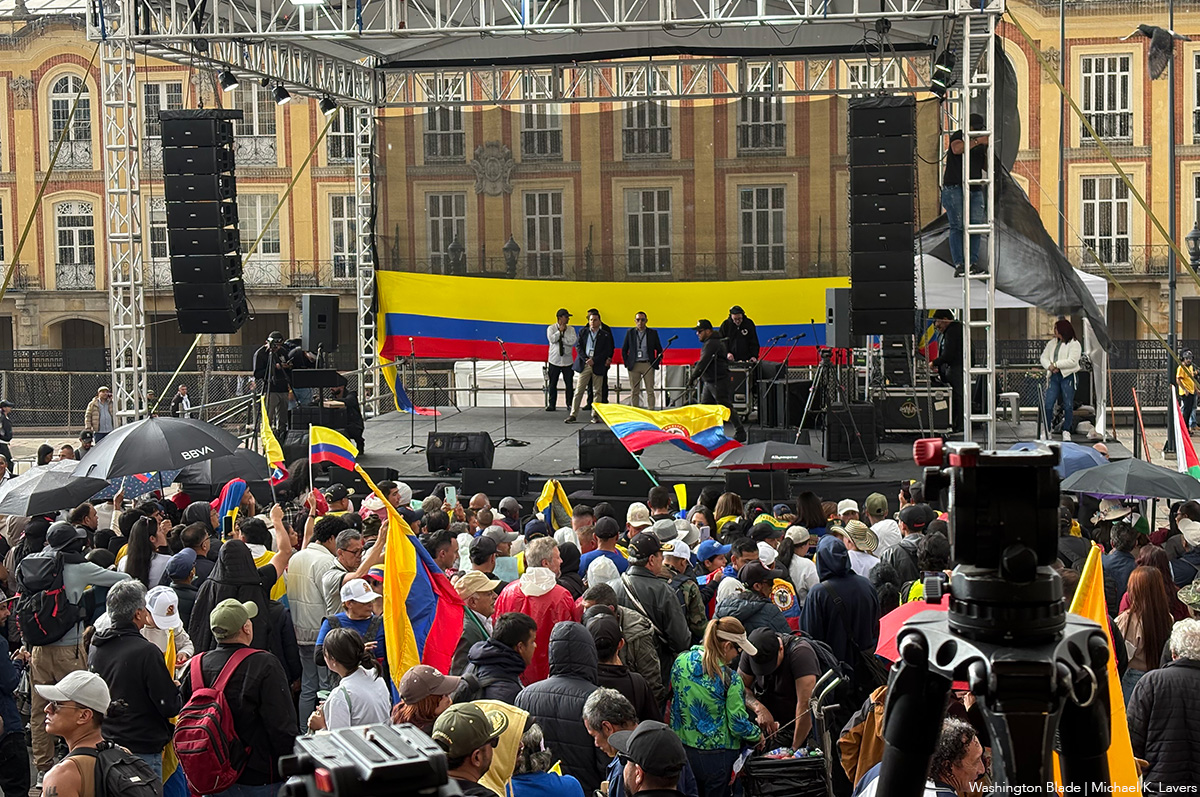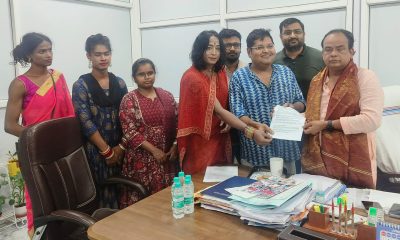World
India Defense Ministry denies clearance to film about gay former soldier
Onir wrote the ‘We Are’ script

An Indian filmmaker has criticized the country’s Defense Ministry’s decision to not approve his film about a former soldier who left the military after he came out as gay.
Onir, who wrote the script “We Are,” which is based on the real-life story of former Maj. J Suresh, filed an official request with the Defense Ministry last year for clearance. The Defense Ministry denied his request after reviewing the script.
According to Onir, Defense Ministry’s officials in a phone call with him said that a main character is a soldier who is gay, which is illegal in the Indian Army. That makes his film ineligible for clearance.
The Defense Ministry in 2020 wrote a letter to the Information and Broadcasting Ministry. It stated that producers must obtain permission from the Defense Ministry before broadcasting a movie or a Web series about the Indian armed forces. While justifying the decision on clearance for any film that shows Army personnel, the Defense Ministry said the morale of Army personnel falls when film producers show an Army man in a derogatory manner.
“There are 56 countries across the world where the LGBTQI community is accepted as part of the military,” Onir told the Washington Blade.
“After the Supreme Court’s verdict of 2018, organically different institutions should have followed the Supreme Court ruling and empowered the community while celebrating the diversity and inclusion, but this is unfortunate that even after Supreme Court’s verdict, the Indian Army does not accept the community as fit enough to serve in the armed forces,” he added further.
The law governing the Indian military makes homosexuality a punishable offense. According to Section 46(a) of the Army Act 1950, any person guilty of any disgraceful conduct of a “cruel, indecent or unnatural kind” will, on conviction by court-martial, face up to seven years in jail.
“Anyone, irrespective of their sexuality, should be evaluated for their work, skill, patriotism or intelligence,” said Onir.
“Sexuality does not define anyone’s skill in the Army or anywhere else, and so LGBTQ people serving the country are equally heroes,” he added.
Onir told the Blade that he had already sent an appeal to the defense secretary and expressed concerns that rejection of his request is discriminatory, but he rejected the idea that he will go to court if the appeal is not granted. Although he is very optimistic this time, Onir said he will think of other ways to make the film possible if the defense secretary rejects his request.
Former Indian Army Chief Bipin Rawat in 2019 said the armed forces will continue to consider homosexuality an offense. Rawat also said that the Indian Army under the Army Act was not “westernized and modernized,” and was “conservative” when it came to dealing with adultery or homosexuality.
Rawat last month died in a helicopter crash.
Defense Minister Rajnath Singh, a right-wing Hindu nationalist, in 2013 said that his party (Bharatiya Janata Party) does not support homosexuality. While taking a conservative position on the matter, Singh further said that homosexuality is an “unnatural act” and can not be supported. In 2018, while striking down colonial-era law, that criminalized homosexuality, the India’s chief justice said that the law will not apply to sex between consenting adults, irrespective of their gender.
The Indian government last year argued in the Delhi High Court that the law does not recognize same-sex marriage in India.
While defending Singh’s 2015 statement in 2015, BJP leader, Subramanian Swamy, in a bizarre statement said “homosexuality is a danger to the national security.” Swamy also said that homosexuality is a “genetic disorder.”
Some BJP leaders have a history of taking extreme homophobic stands. Sudhir Mungantiwar, a BJP lawmaker, recently stirred controversy by questioning Maharastra state’s government’s move to appoint representatives of the LGBTQ community as members of universities.
“Are you going to hire lesbians and gays as members? Shouldn’t a joint medical committee be set up on this? It mentions bisexual and asexual relations. However, no one has yet defined these,” said Mungantiwar. “Even someone who has sex with an animal can become a member, as per the government’s proposal. Will the animal certify to their sexual relationship?”
Onir believes the Indian military will soon adopt the policy to allow the LGBTQ people to serve.
“India has good relations with American, French and the British military. All these countries allow LGBTQ personnel for the service,” Onir said. “These militaries practice together sometimes, so sooner or later Indian Army will change the policy and will allow LGBTQ people.”
Onir has won 16 film awards, including two national awards. Talking about his upcoming movies, Onir said he is working on “Sid,” a coming-of-age film, and a lesbian rom-com which is based on the life of writer Raga Olga D’silva.
“Although Bollywood, the Indian film industry, makes over a thousand films every year,” said Onir. “The number of films depicting LGBTQ stories is still negligible,” he added.
Lieutenant Gen. Manoj Pande took over as the new Army chief on Feb. 1.
It remains to be seen if the new Army chief adopts the more liberal policies or follows his predecessors, but a growing number of Indian young people are demanding equal rights for the LGBTQ community.
Mohit Kumar (Ankush) is a freelance reporter who has covered different stories that include the 2020 election in the U.S. and women’s rights issues. He has also covered NASA, the European Space Agency, the Canadian Space Agency and loves to help people. Mohit is on Twitter at @MohitKopinion and can be reached at [email protected].
Venezuela
AHF client in Venezuela welcomes Maduro’s ouster
‘This is truly something we’ve been waiting for’ for decades

An AIDS Healthcare Foundation client who lives in Venezuela told the Washington Blade he welcomes the ouster of his country’s former president.
The client, who asked the Blade to remain anonymous, on Thursday said he felt “joy” when he heard the news that American forces seized Nicolás Maduro and his wife, Cilia Flores, at their home in Caracas, the Venezuelan capital, during an overnight operation on Jan. 3.
“This is truly something we’ve been waiting for for 26 or 27 years,” the AHF client told the Blade.
Hugo Chávez became Venezuela’s president in 1999. Maduro succeeded him in 2013 after he died.
“I’ve always been in opposition,” said the AHF client, who stressed he was speaking to the Blade in his personal capacity and not as an AHF representative. “I’ve never agreed with the government. When I heard the news, well, you can imagine.”
He added he has “high hopes that this country will truly change, which is what it needed.”
“This means getting rid of this regime, so that American and foreign companies can invest here and Venezuela can become what it used to be, the Venezuela of the past,” he said.
The AHF client lives near the Colombia-Venezuela border. He is among the hundreds of Venezuelans who receive care at AHF’s clinic in Cúcuta, a Colombian city near the Táchira River that marks the border between the two countries.
The Simón Bolívar Bridge on the Colombia-Venezuela border on May 14, 2019. (Washington Blade video by Michael K. Lavers)
The AHF client praised U.S. President Donald Trump and reiterated his support for the Jan. 3 operation.
“It was the only way that they could go,” he said.
The Venezuelan National Assembly on Jan. 4 swore in Delcy Rodríguez, who was Maduro’s vice president, as the country’s acting president. The AHF client with whom the Blade spoke said he is “very optimistic” about Venezuela’s future, even though the regime remains in power.
“With Maduro leaving, the regime has a certain air about it,” he said. “I think this will be a huge improvement for everyone.”
“We’re watching,” he added. “The actions that the United States government is going to implement regarding Venezuela give us hope that things will change.”
Colombia
Colombians protest against Trump after he threatened country’s president
Tens of thousands protested the US president in Bogotá

BOGOTÁ, Colombia — Tens of thousands of people on Wednesday gathered in the Colombian capital to protest against President Donald Trump after he threatened Colombian President Gustavo Petro.
The protesters who gathered in Plaza Bolívar in Bogotá held signs that read, among other things, “Yankees go home” and “Petro is not alone.” Petro is among those who spoke.
The Bogotá protest took place four days after American forces seized now former Venezuelan President Nicolás Maduro and his wife, Cilia Flores, at their home in Caracas, the Venezuelan capital, during an overnight operation.
The Venezuelan National Assembly on Sunday swore in Delcy Rodríguez, who was Maduro’s vice president, as the country’s acting president. Maduro and Flores on Monday pleaded not guilty to federal drug charges in New York.
Trump on Sunday suggested the U.S. will target Petro, a former Bogotá mayor and senator who was once a member of the M-19 guerrilla movement that disbanded in the 1990s. Claudia López, a former senator who would become the country’s first female and first lesbian president if she wins Colombia’s presidential election that will take place later this year, is among those who criticized Trump’s comments.
The Bogotá protest is among hundreds against Trump that took place across Colombia on Wednesday.
Petro on Wednesday night said he and Trump spoke on the phone. Trump in a Truth Social post confirmed he and his Colombian counterpart had spoken.
“It was a great honor to speak with the president of Colombia, Gustavo Petro, who called to explain the situation of drugs and other disagreements that we have had,” wrote Trump. “I appreciated his call and tone, and look forward to meeting him in the near future. Arrangements are being made between Secretary of State Marco Rubio and the foreign minister of Colombia. The meeting will take place in the White House in Washington, D.C.”

Colombia
Gay Venezuelan man who fled to Colombia uncertain about homeland’s future
Heberth Aguirre left Maracaibo in 2018

BOGOTÁ, Colombia — A gay Venezuelan man who has lived in Colombia since 2018 says he feels uncertain about his homeland’s future after the U.S. seized now former Venezuelan President Nicolás Maduro.
“On one hand I can feel happy, but on the other hand I feel very concerned,” Heberth Aguirre told the Washington Blade on Tuesday during an interview at a shopping mall in Bogotá, the Colombian capital.
Aguirre, 35, is from Maracaibo, Venezuela’s second-largest city that is the heart of the country’s oil industry.
He developed cultural and art initiatives for the Zulia State government.
“Little by little, I suddenly became involved in politics because, in a way, you had to be involved,” recalled Aguirre. “It was necessary to be involved because the regime often said so.”
“I basically felt like I was working for the citizens, but with this deeply ingrained rule we had to be on their side, on the side of the Maduro and (former President Hugo) Chávez regime,” he added.
Maduro in 2013 became Venezuela’s president after Chávez died.
“There are things I don’t support about the regime,” Aguirre told the Blade. “There are other things that were nice in theory, but it turned out that they didn’t work when we put them into practice.”
Aguirre noted the Maduro government implemented “a lot of laws.” He also said he and other LGBTQ Venezuelans didn’t “have any kind of guarantee for our lives in general.”
“That also exposed you in a way,” said Aguirre. “You felt somewhat protected by working with them (the government), but it wasn’t entirely true.”
Aguirre, 35, studied graphic design at the University of Zulia in Maracaibo. He said he eventually withdrew after soldiers, members of Venezuela’s Bolivarian National Guard, and police officers opened fire on students.
“That happened many times, to the point where I said I couldn’t keep risking my life,” Aguirre told the Blade. “It hurt me to see what was happening, and it hurt me to have lost my place at the university.”
Venezuela’s economic crisis and increased insecurity prompted Aguirre to leave the country in 2018. He entered Colombia at the Simón Bolívar Bridge near the city of Cúcuta in the country’s Norte de Santander Province.
“If you thought differently, they (the Venezuelan government) would come after you or make you disappear, and nobody would do anything about it,” said Aguirre in response to the Blade’s question about why he left Venezuela.
The Simón Bolívar Bridge on the Colombia-Venezuela border on May 14, 2019. (Washington Blade video by Michael K. Lavers)
Aguirre spoke with the Blade three days after American forces seized Maduro and his wife, Cilia Flores, at their home in Caracas, the Venezuelan capital, during an overnight operation.
The Venezuelan National Assembly on Sunday swore in Delcy Rodríguez, who was Maduro’s vice president, as the country’s acting president. Maduro and Flores on Monday pleaded not guilty to federal drug charges in New York.
President Donald Trump on Tuesday in a Truth Social post said Venezuela’s interim authorities “will be turning over between 30 and 50 million barrels of high quality, sanctioned oil, to the United States of America.”
“This oil will be sold at its market price, and that money will be controlled by me, as president of the United States of America, to ensure it is used to benefit the people of Venezuela and the United States,” wrote Trump.
Trump on Sunday suggested the U.S. will target Colombian President Gustavo Petro, a former Bogotá mayor and senator who was once a member of the M-19 guerrilla movement that disbanded in the 1990s.
Petro has urged Colombians to take to the streets on Wednesday and “defend national sovereignty.” Claudia López, a former senator who would become the country’s first female and first lesbian president if she wins Colombia’s presidential election that will take place later this year, is among those who criticized Trump’s comments.
“Let’s be clear: Trump doesn’t care about the humanitarian aspect,” said Aguirre when the Blade asked him about Trump. “We can’t portray him as Venezuela’s savior.”
Meanwhile, Aguirre said his relatives in Maracaibo remain afraid of what will happen in the wake of Maduro’s ouster.
“My family is honestly keeping quiet,” he said. “They don’t post anything online. They don’t go out to participate in marches or celebrations.”
“Imagine them being at the epicenter, in the eye of the hurricane,” added Aguirre. “They are right in the middle of all the problems, so it’s perfectly understandable that they don’t want to say anything.”
‘I never in my life thought I would have to emigrate’
Aguirre has built a new life in Bogotá.
He founded Mesa Distrital LGBTIQ+ de Jóvenes y Estudiantes, a group that works with migrants from Venezuela and other countries and internally placed Colombians, during the COVID-19 pandemic. Aguirre told the Blade he launched the group “with the need to contribute to the general population, not just in Colombia.”
Aguirre met his husband, an American from California, at a Bogotá church in December 2020 during a Christmas event that SDA Kinship Colombia, an LGBTQ group, organized. A Utah judge virtually officiated their wedding on July 12, 2024.
“I love Colombia, I love Bogotá,” said Aguirre. “I love everything I’ve experienced because I feel it has helped me grow.”
He once again stressed he does not know what a post-Maduro Venezuela will look like.
“As a Venezuelan, I experienced the wonders of that country,” said Aguirre. “I never in my life thought I would have to emigrate.”
The Colombian government’s Permiso por Protección Temporal program allows Aguirre and other Venezuelans who have sought refuge in Colombia to live in the country for up to 10 years. Aguirre reiterated his love for Colombia, but he told the Blade that he would like to return to Venezuela and help rebuild the country.
“I wish this would be over in five years, that we could return to our country, that we could go back and even return with more skills acquired abroad,” Aguirre told the Blade. “Many of us received training. Many of us studied a lot. We connected with organizations that formed networks, which enriched us as individuals and as professionals.”
“Returning would be wonderful,” he added. “What we’ve built abroad will almost certainly serve to enrich the country.”
-

 National4 days ago
National4 days agoWhat to watch for in 2026: midterms, Supreme Court, and more
-

 District of Columbia5 days ago
District of Columbia5 days agoTwo pioneering gay journalists to speak at Thursday event
-

 Colombia4 days ago
Colombia4 days agoBlade travels to Colombia after U.S. forces seize Maduro in Venezuela
-

 a&e features5 days ago
a&e features5 days agoQueer highlights of the 2026 Critics Choice Awards: Aunt Gladys, that ‘Heated Rivalry’ shoutout and more




















